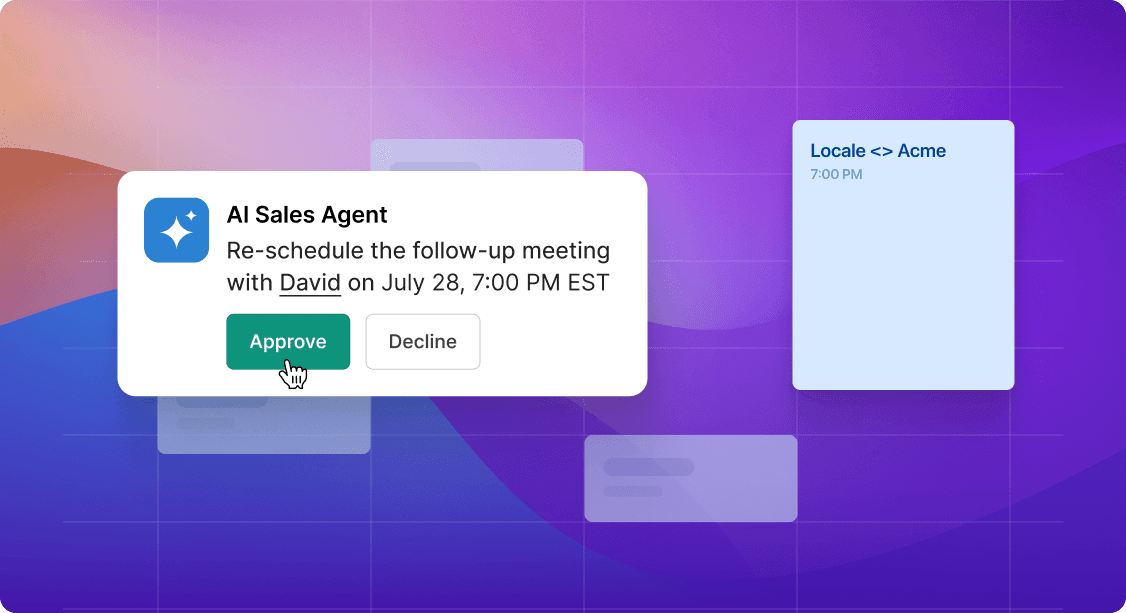author
Shashank Tiwari
date
Sep 9, 2024
AI sales assistants are transforming how sales teams work by automating time-consuming tasks like prospecting, CRM management, and follow-ups. This results in sales reps getting free from busy work and focusing on engaging with prospects and closing deals.
Locale.ai offers a suite of AI assistants that can automate these processes, helping sales teams boost productivity and drive better outcomes while keeping a "human-in-the-loop" for final oversight.
According to Salesforce, 60% of professionals believe that AI has already improved their selling capabilities. AI sales assistants are becoming an essential tool for sales teams looking to optimize efficiency, personalize outreach, and ultimately increase revenue. These assistants can take over all the mundane and time-consuming tasks that sales teams traditionally spend 80% of their time on, such as prospecting, researching, CRM updating, and post-demo follow-ups.
These AI agents can automate sales processes with a level of personalization and accuracy that was unattainable just a few years back.
In this blog, we’ll explore 23 use cases for AI sales assistants, detailing how they can automate key sales processes and improve sales team performance.
Identifying potential leads
The AI assistant scans various sources (social media, company websites, business directories, industry news, 3rd party data providers) to identify potential leads that match the ideal customer profile based on predefined criteria such as industry, company size, and role.
Research about the prospect and company
AI assistants will collect all the required information about the prospect and the company by conducting thorough research on leading platforms like ZoomInfo, Apollo, 6sense, Crunchbase, LinkedIn, Clearbit, Bombora, and more. These details are sent in an easy-to-read format to the sales rep over Slack. If the sales rep wants more info, they can ask the agent directly on the Slack thread and the agent will fetch more details.
Automating LinkedIn connection requests
Once an account is identified, it’s important to do an omnichannel reach-out. For B2B businesses, one place their prospects are always available on is Linkedin. AI can send personalized connection requests on LinkedIn.
Automating LinkedIn messages
AI agents can send tailored DMs to leads on LinkedIn to timely engage prospects effectively.
Cold email outreach campaign
AI assistants can create an email outreach campaign which is personalized to each prospect’s specific context and pain points. It can also send out follow-ups at optimal times, and analyze response rates to refine the outreach campaign over time.
Updating CRM with prospect and company research
Sales reps often need to input details such as contact information, meeting notes, and follow-up actions. AI assistants can update the prospect and company research as fields in the CRM automatically. This helps the sales reps save time on manually updating CRM for every prospect.
Enriching CRM with information from meeting transcripts, email and phone conversations
AI sales assistants enrich leads by analyzing past interactions, such as emails, calls, and meetings, to pull additional insights. They can update the CRM with these insights to provide a fuller picture of each prospect.
Creating deals
The AI agent can automatically create new deals in the CRM when a prospect is marked as qualified and interested.
Updating fields and deal stages in CRM throughout the sales cycle
As deals progress through the sales pipeline, it's crucial to keep the CRM updated with the latest information. AI sales agents can automatically update CRM fields as soon as new information about the prospect or the company presents itself.
Send effective follow-up communication
After a demo, it's essential to send personalized follow-up emails that resonate with the prospect. The AI assistant will automatically extract key points from the meeting transcript, such as pain points discussed, product features of interest, and any objections raised. They will use this info to create highly relevant, customized follow-up emails that keep the prospect engaged and make them ready for the next stage of the sales process. AI can also generate collaterals such as product brochures, case studies, or custom presentations for the prospect. Read more about this use case.
Sending invites for the next round of discussion
Scheduling follow-up meetings is another critical step in the post-demo process. AI sales agents can handle this by automatically sending invites for the next round of discussions, coordinating with the prospect's availability, and ensuring that all necessary stakeholders are included.
Creating a follow-up task for the sales rep
To ensure that no follow-up actions are missed, AI assistants can automatically create tasks and reminders for the sales reps. This reduces the risk of follow-up delays and keeps the prospect engaged throughout the sales process.
Automating proposal generation
Once a prospect expresses strong interest, the next step is often to send a detailed proposal. AI sales assistants can generate customized proposals based on the prospect's specific requirements, preferences, and the details discussed during the demo.

Booking meetings
AI sales agents can take over the task of booking meetings by analyzing the availability of all participants, finding suitable time slots, and automatically sending out calendar invites.

Rescheduling meetings
AI sales agents can handle rescheduling requests and can automatically update calendar invites and notify all participants of the new meeting time, reducing the risk of miscommunication.
Confirming meetings
AI sales agents can automatically send out reminder emails or messages to all participants, confirming their attendance a day or a few hours before the meeting. This helps to reduce no-shows and ensures that all necessary stakeholders are present.
Lead routing
Once leads are enriched with detailed information, it’s important to route them to the appropriate sales reps who are best suited to handle their specific needs. AI sales assistants can automate lead routing by using predefined rules and criteria, such as industry, geographic location, lead source, product specialization, workload, etc. This ensures that leads are handled by the most suitable representative, increasing the chances of conversion.
Lead scoring and qualification
Not all leads are equal, and some require more immediate attention than others. AI sales assistants can automatically score leads based on their behaviour, engagement levels, and other relevant factors. AI can then assign a score to each lead, indicating its potential value and priority. They can thus mark a lead as qualified or unqualified automatically.
Real-time sales coaching and objection handling
During sales calls, reps often encounter unexpected questions or objections that require immediate and effective responses. AI sales assistant can act as a virtual coach, analyzing the conversation as it unfolds and offering real-time coaching tips to the sales rep. This real-time coaching ensures that sales reps are better equipped to handle objections confidently and effectively, increasing their chances of closing the deal.
Personalizing sales pitches using sentiment analysis
AI sales agents can perform real-time sentiment analysis by monitoring the tone, pace, and language used by the prospect. By adapting the sales pitch based on the prospect’s emotional cues, AI helps create a more empathetic and responsive sales experience, improving the likelihood of a positive outcome.
Detecting upsell and cross-sell opportunities
During live conversations, prospects may inadvertently reveal needs or interests that indicate potential for upselling or cross-selling. AI sales agents can detect these cues in real-time, identifying opportunities to offer additional products or services that complement what the prospect is already considering.
Monitoring sales rep performance
AI assistants can continuously track key performance metrics for each sales rep, providing a comprehensive view of individual and team performance. AI can identify patterns and trends that indicate areas of strength as well as opportunities for improvement.
Analyzing call recordings for feedback
AI assistants can review call recordings in detail and identify key moments, sentiments, and outcomes within each conversation. This analysis can pinpoint specific areas where a sales rep may have missed opportunities, handled objections poorly, or failed to align with the prospect’s needs.
Using Locale to get started with AI sales assistants
Locale.ai has a collection of AI sales assistants that can automate most of the above tasks, from prospecting and personalized outreach to CRM management, post-demo follow-ups, and real-time sales guidance. This allows sales teams to focus on what they do best—engaging with prospects and closing deals—while the AI takes care of the heavy lifting.
If you're intrigued by the possibilities and want to deploy AI assistants for yourself or your sales team, we’re here to help. Schedule a call to learn more.
